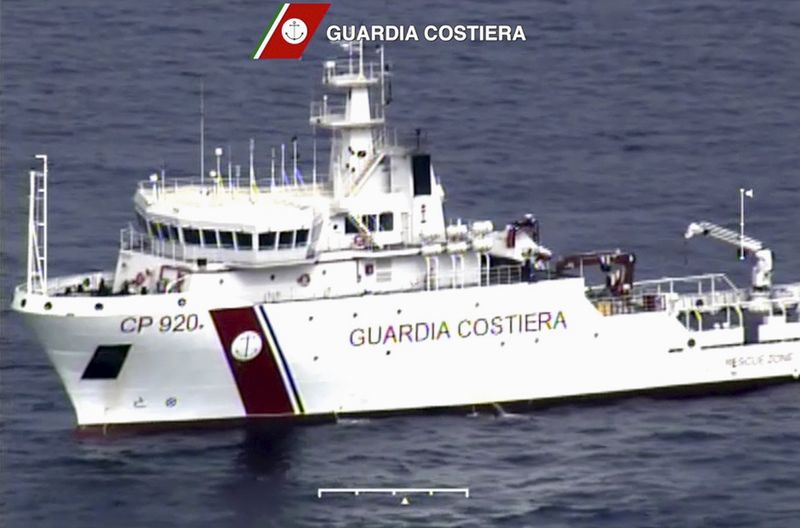By Alastair Macdonald
BRUSSELS (Reuters) - The outrage Europe's leaders face over the deaths of hundreds of refugees trying to reach its shores may force a shift in a policy critics decry as letting people drown to deter others in desperate need.
The moat that the Mediterranean forms between Fortress Europe and less fortunate neighbours may become slightly less forbidding, even if the focus will still be to discourage the crossing in ways other than raising the risk of dying at sea.
Scrambling to respond to the deaths of up to 700 people on a fishing boat making for Italy from Libya, EU foreign ministers meet on Monday, and government leaders, some of whom are already calling for change, may also gather soon..
Yet they must grapple with a dilemma that prompted them to scale back a rescue operation in October on fears it had, in the words of the German interior minister, become "a bridge to Europe" for hundreds of thousands fleeing war and poverty in Africa and the Middle East. Governments beset by anti-immigrant parties now face a backlash for neglecting humanitarian disaster.
"The EU may have the means to rescue the refugees fleeing the hell of Syria and Libya, but it is letting them drown," German jurist Heribert Prantl wrote in the Sueddeutsche Zeitung.
"Europe is using dead refugees to shield itself from the others," he said. "Europe has battened down the hatches."
The speaker of the European Parliament spoke of "shame". And campaigners for refugees said they were encouraged that popular outcry could now bring change, albeit limited by self-interest on a continent fretful over unemployment and terrorist threats.
Easier access to asylum on the southern shore and a drive to end squabbling among EU states over who takes how many refugees are elements in a strategy the EU executive has been working on.
But in the short term, the death toll may be turning the tide in favour of those like Italian Prime Minister Mario Renzi who have been calling for more EU naval resources to save lives and against those who likened last year's Mare Nostrum rescue operation mounted by Italy as a "ferry service" for illegals.
"This issue of the deaths of migrants has finally made it to the international radar," said Leonard Doyle, spokesman for the International Office for Migration in Geneva. "We're starting to see people react to the humanitarian aspect of it."
"PULL FACTOR"
The British government has criticised a limited EU search-and-rescue mission, saying it could draw more migrants out to sea.
"They create an unintended 'pull factor', encouraging more migrants to attempt the dangerous sea crossing and thereby leading to more tragic and unnecessary deaths," Joyce Anelay, a junior foreign minister, told parliament in London in October.
EU foreign affairs chief Federica Mogherini also cited the "pull factor" in an internal paper, seen by Reuters, that will be put to foreign ministers in Luxembourg on Monday. It is given as a downside risk to a proposal for possible EU naval patrols to combat Libyan oil and arms smuggling.
But the IOM's Doyle said: "There is no evidence we can see that there is a pull factor in having a life-saving mission."
Statistical evidence is unclear, said Niels Frenzen, a University of Southern California law professor who helped challenge the U.S. response to Haitian refugees in the 1990s.
While migrant numbers rose in the year after Italy began its Mare Nostrum operation in response to a mass drowning in 2013 off its island of Lampedusa, Frenzen said that also corresponded to a "push factor" from increasing violence in Syria and Libya.
Hostility to immigration, even from other EU states, had led to a "passive approach" by European leaders. They would, he said, also find it difficult to set up asylum camps in North Africa and the Middle East in the way U.S. authorities held Haitians at the Guantanamo Bay naval base in Cuba in the 1990s.
"We've got to be looking at a programme that brings in hundreds of thousands of people," he said. "These camps become independent enclaves, and security issues are a nightmare."
"MORAL MYOPIA"
Aside from chaos in Syria, Iraq or Libya - in part a result of European interventions there - a huge gulf in wealth across the Mediterranean will continue to draw economic migrants. EU per capita national income is 30 times that in a good many African states, a discrepancy 10 times greater than that on either side of the heavily patrolled U.S.-Mexican border.
But Ska Keller, who speaks on migration for the Greens in the European Parliament, saw popular pressure ending a "cynical" EU policy of "letting people drown".
"Just because those who against immigration are noisier doesn't mean they are the majority," she said. "I think there has been a shift."
Following the latest deaths, there was little renewal of past criticism of rescue operations. German Interior Minister Thomas de Maiziere called Sunday's sinking a "tragedy" and said the EU must step up efforts to coordinate migration strategy.
Anders Lustgarten, whose current London play "Lampedusa" examines how ordinary people can challenge the larger forces that drive desperate refugees and economic misery, excoriated the "moral myopia" and "malice by proxy" that he sees in the EU's cutting resources available to rescue migrants.
"The public backlash is the only thing that will stop it," he told Reuters.
And since his polemical piece on the refugee crisis in the Guardian last week was shared more than 12,000 times, he thinks that may be starting.

"Nothing will stop the EU beyond mass political pressure," he said, "and I think it's quite encouraging that there does seem to be today a really strong human reaction."